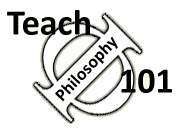Teach Philosophy 101
Free resources for
philosophy teachers!
"One of the most comprehensive, well-researched, and accessible guides for teachers that I have ever seen." James Lang, Chronicle of Higher Education (read full review of TΦ101)
Books and Journals
There is a huge variety of material available on teaching and a number of specific resources are mentioned in each section.
TΦ101's two favorite books are:
-
Erickson, Brett LaSere, Calvin B. Peters, Diane Weltner Strommer, Teaching First-Year College Students. Jossey-Bass, 2006. This wonderful book is based on a vast quantity of research. It is readable and has dozens of great ideas.
-
Lang, James M. On Course: A Week-By-Week Guide to your First Semester of College Teaching. Harvard University Press, 2010. This is another outstanding book, organized to follow the process of planning and teaching a course. Although it is entirely based in research and good practice, On Course is a more narrative exposition.
In a way, the difference between the two books is partially stylistic. While the Erikson book is more like a wonderful textbook, reading On Course is more like having a conversation with a brilliant senior mentor who who meets with you each week to discuss teaching and learning problems.
Helpful books on course design
-
Fink, L. Dee. Creating significant learning experiences: An integrated approach to designing college courses. John Wiley & Sons, 2013. There is a fantastic free workbook available here.
-
Wiggins, Grant, Grant P. Wiggins, and Jay McTighe. Understanding by design. ASCD, 2005. Helpful overview here.
Here are some other amazing works:
-
Barkley, Elizabeth F., K. Patricia Cross, Claire Howell Major. Collaborative Learning Techniques: A Handbook for College Faculty. San Francisco: Jossey-Bass, 2005. Dozens of ideas for group work.
-
Barkley, Elizabeth F., and Claire H. Major. Student engagement techniques: A handbook for college faculty. John Wiley & Sons, 2020.
-
Bean, John. Engaging Ideas: The Professor's Guide to Integrating Writing, Critical Thinking, and Active Learning in the Classroom. San Francisco: Jossey-Bass, 1996.
-
Bok, Derek. Our Underachieving Colleges: A Candid Look at How Much Students Learn and Why They Should be Learning More. Princeton: Princeton University Press, 2006. The former Harvard President says in public the things that the insiders know but rarely reveal. He probably can't even get lunch at the Harvard Club anymore after writing this.
-
Davis, Barbara Gross, Tools for Teaching. San Francisco: Jossey-Bass, 2009. An excellent book, actually quite similar to TΦ101 in its intention and design. Dozens of topics are covered, from how to design a test, give a lecture, to how to use a guest speaker. Each topic has a list of practical brief pointers, backed up by an amazing amount of reseach. TΦ101 favorite.
-
Eble, Kenneth E. The Craft of Teaching: A Guide to Mastering the Professor's Art. 2nd Ed. San Francisco: Jossey-Bass, 1998. This wonderful book is based on a vast quantity of research, is readable, and has dozens of great ideas. TΦ101 favorite.
-
Filene, Peter, The Joy of Teaching: a Practical Guide for New College Instructors. Chapel Hill: University of North Carolina Press, 2005. A short and readable discussion of the challenges that face the new instructor, with practical suggestions and tips.
-
Finn, Stephen, et. al.The Philosophy Skills Book. New York: Continuum, 2012. This rather unique volume tries to meet students where they are, explaining basic ideas such as philosophical vocabulary, and how to read a text. Although meant as a book for students, it could also be used for instructors. Full disclosure: Finn and TΦ101 go way back!
-
Johnson, D.W., Johnson, R.T., and Smith, K.A. Cooperative Learning: Increasing College Faculty Instructional Productivity. ASHE-ERIC Higher Education Report, 4. Washington, D.C.: Graduate School of Education and Human Development, George Washington University, 1991. Gives both the theory and practical application of doing group work in class.
-
McKeachie, Wilbert J. Teaching Tips: Strategies, Research, and Theory for College and University Teachers. 10th ed. New York: Houghton Mifflin, 1999. A classic, with many many strategies, all grounded in research.
-
Nathan, Rebekah. My Freshman Year: What a Professor Learned by Becoming a Student. Ithaca: Cornell University Press, 2005.
-
Nilson, Linda B. Teaching at its Best: A research-Based Resource for College Instructors. San Francisco: Josey-Bass, 2010. Organized along similar lines as TΦ101, this book is full of practical suggestions, based in research. TΦ101 favorite.
-
Palmer, Parker. The Courage to Teach. San Francisco: Jossey-Bass, 1998.
Journals:
-
Teaching Philosophy is a quarterly journal published since 1975. It is edited by Maralee Harrell. Each issue is filled with ideas and resources, and all issues are available online. The free tables of contents are a good place to explore this essential publication.
-
Teaching Ethics is the biannual journal of the Society for Ethics Across the Curriculum. Edited by Mark C. Vopat and Alan Tomhave, this journal is focused on ethics as a dimension of all academic inquiry. All issues are available online.
-
The APA Newsletter on Teaching Philosophy, edited by Tziporah Kasachkoff and Eugene Kelly has a wide range of articles, and recent issues are available on-line. it is sponsored by the American Philosophical Association.
-
AAPT Studies in Pedagogy is a new annual journal that publishes thematically focused volumes on teaching and learning philosophy. Edited by Kevin Hermberg and Rory Kraft, it is sponsored by the American Association of Philosophy Teachers.
Updated April 2020
